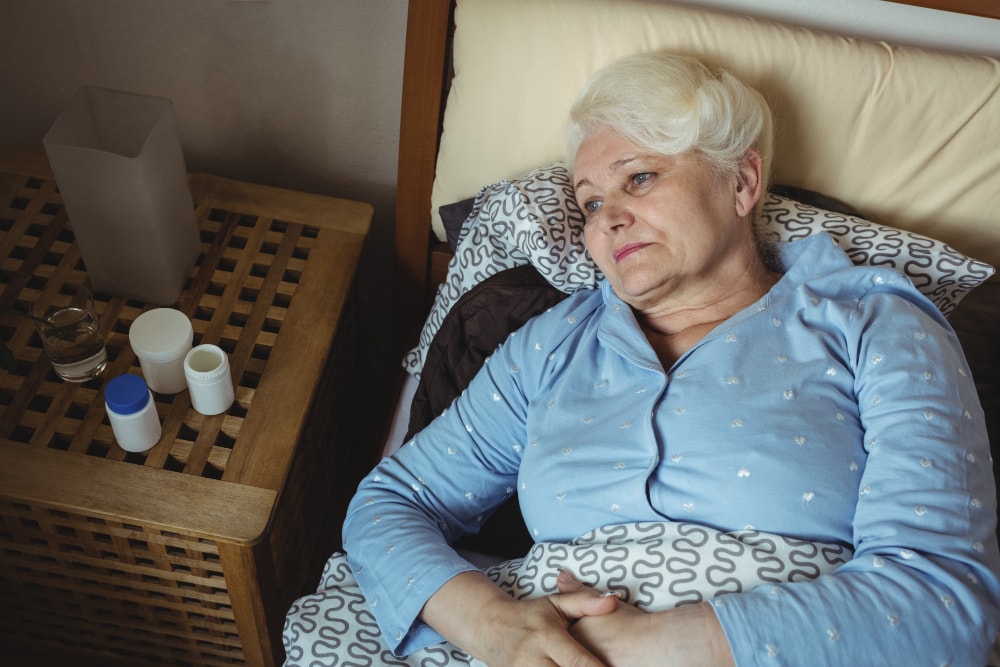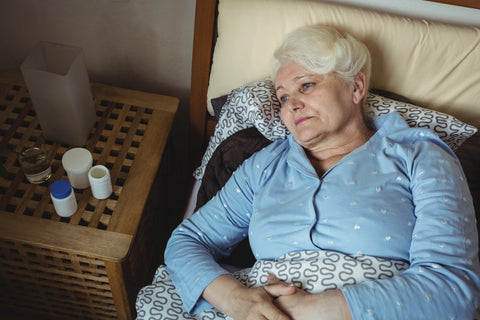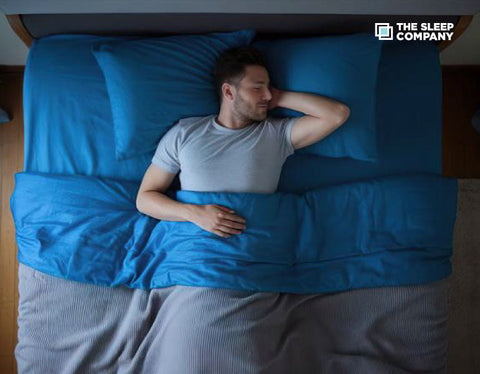My Cart

How Can Alzheimer’s Patients Deal With Sleep Problems?


“Alzheimer’s” is a word that brings stress to patients and their families. The disease not just brings tension to the patients and families but struggle, continuous worry, fear, and sleepless nights.
People with Alzheimer’s face many issues, from forgetting things to sleepless nights, further increasing other matters for them and their loved ones.
Therefore it becomes essential to find a solution to help them reduce suffering, and it is vital to understand the relation between Alzheimer’s and sleep.
What is Alzheimer’s?

Alzheimer’s disease is a prevalent cause of dementia and a progressive neurodegenerative illness that destroys brain cells and causes the brain to shrink (atrophy). Early Alzheimer’s symptoms include forgetting about recent occurrences.
As the illness worsens, patients experience difficulties with orientation, getting lost, communication, self-negligence, lack of motivation, mood swings, and behavioral issues, which further impairs their independence and social life.
Who can get affected by it?
People over 65 get affected mainly by Alzheimer’s disease, which worsens as they age. Dementia or other types, including Alzheimer’s, are more common as a person ages.
According to some reports, around 60% of people above the age of 65 get affected by Alzheimer’s or Dementia. And 1 to 2 % of people inherit it.
How does it affect sleep?
Any aberrant changes in our daily lives cause sleep upheavals. However, Alzheimer’s disease complicates matters not just for the sufferer but also for their loved ones. Alzheimer’s disease causes disruptions in the sleep cycle and biological clock, resulting in sleep abnormalities and shorter or longer sleep segments.
As we age, the sleep cycle changes and disruptions are expected. But, Alzheimer’s symptoms and sleep have a reciprocal relationship between them. Thus, losing sleep worsens conditions like hallucinations, restlessness, and confusion, which in turn causes sleep disorders and others issues also.
Alzheimer’s patients and sleep disorders
Alzheimer’s patients undergo abrupt sleep cycle changes, impacting their circadian rhythm. Cellular changes in the brain, an irregular production of sleep hormones like melatonin, reduced physical activities, and lessened daylight exposure are some causes of worsened sleep issues and disorders amongst Alzheimer’s patients.
Alzheimer’s patients may get affected by disorders, such as,
Insomnia
Insomnia is a common sleep disorder that maximum people face at least once in their life. However, people with Alzheimer’s are more prone to get affected by it.
People with Insomnia face problems like issues with falling asleep, frequently waking up, and failing to sleep again after waking up.
Alzheimer’s patients’ biological clock or circadian rhythm gets affected, which makes them take naps in day time frequently, which further induces Insomnia.
Obstructive sleep apnea (OSA)
Obstructive sleep apnea or OSA has symptoms like snoring, choking, and breathing issues due to airway collapse during sleep. Studies show that Alzheimer’s patients are more immune to developing OSA than others.
The cerebrospinal fluid (CSF) AD-biomarkers which are early indicators of Alzheimer’s, are also associated with OSA.
Restless legs syndrome (RLS)
An unsettling or tingling feeling in the legs is a symptom of Restless legs syndrome or RLS. People with Alzheimer’s are more vulnerable and have a higher rate of getting impacted by Restless legs syndrome.
Sundowning
A late-day confusion that occurs as the day begins to set is referred to as Sundowning. Alzheimer’s patients face Sundowning syndrome, mainly in the middle stage of the disease. Symptoms of Alzheimer’s disease may be minor and irregular in the early stages, but they gradually worsen until waning down in the final stages of the patient’s lifespan.
How to help Alzheimer’s patients sleep at night?

There is no cure for Alzheimer’s and sleep issues caused because of it. However, some solutions can help patients slow the procedure and ease the problems.
Exercise
Exercises help in energy exertion, which further helps in sleeping at night. Also, working out or walking and running outside helps in getting daylight exposure which further helps in the regularization of the circadian rhythm.
Sleep schedule
An organized sleep schedule helps Alziemer patients to sleep with ease and remain asleep for most of the night. It also helps patients’ caregivers sleep at night without stressing much over the patient’s abnormal awakening.
Control naps
Due to disrupted circadian rhythm, Alzheimer’s patients tend to fall asleep during the daytime, which makes them remain awake at night for long hours despite laying on the mattress.
To avoid sleepless nights, caregivers must monitor the nap times of the patients and help them reduce naps during the day by keeping them busy with other things.
Add light exposure
Light exposure helps the biological clock or circadian rhythm to remain regular and keeps sleep-wake time in check. Make Alzheimer’s patients go outside the house to get exposure to daylight to stimulate their circadian rhythm and sleep hormone production.
Bedtime routine
Setting up a bedtime or before sleep routine is beneficial. Since Alzheimer’s makes people forget things, doing things daily helps them remember without much difficulty.
Reading books or listening to soothing music or old music before hitting the mattress every day will create a chain reaction that will help their brain to relate these actions with sleep time and make them fall asleep quickly.
Comfortable bedroom
It always helps to have a comfortable and familiar surrounding for a person. And people with Alzheimer’s may quickly get confused and scared in unfamiliar and uncomfortable surroundings, which ultimately affect their sleep.
Therefore, make sure that,
- Many people have issues falling asleep in a new place or on a new mattress, let alone Alzheimer’s patients. Therefore, ensure that Alzheimer’s patients’ sleeping place remains the same.
- Also, buy mattress online that will help them stay comfortable and provide enough support not to cause any other issues like body pain or back pain.
- Try not to change places of the bedside furniture or things as it can cause more confusion for them.
- Alzheimer’s patients may find comfort in familiar situations or routines. Thus, make sure that patients do not use the bedroom or mattress for anything other than sleeping.
Medication
Alzheimer’s patients are, by default, given medications that help them slow down the progression of the disease. However, it also has side effects that cause sleep issues or disorders.
If, despite following other home remedies and solutions, patients find it difficult to sleep, then take help of medications on the doctor’s advice.
Bottom Line:
It is challenging to see our loved ones succumb to diseases. And watching them struggle to get those peaceful hours of good night’s sleep makes us and them more troubled.
Though few remedies are available to cure sleep issues in Alzheimer’s patients, there is no harm in trying solutions as mentioned above and helping them ease some of the pain.


































































